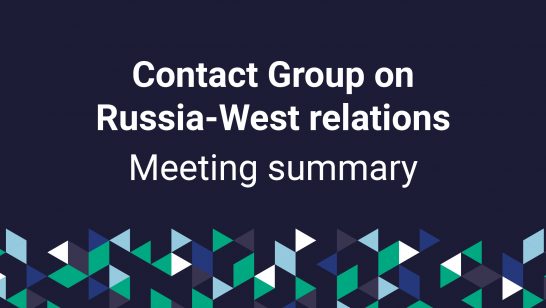
Ideally, when the conflict over Ukraine began, the NATO-Russia Council should have been meeting on a permanent basis, and NATO should have invited Putin for a summit meeting of that body. In reality, the Council did not fulfil its potential. After the illegal annexation of Crimea and the undeclared Russian war in Eastern Ukraine, is there a point for NATO in resuming dialogue with Russia?
It is always right to implement NATO’s Harmel philosophy of 1967: defence and détente, firmness and readiness for dialogue. It’s most tangible manifestation was the Alliance’s 1979 double-track decision. Together with Western determination to station Pershing II and cruise missiles in western Europe, it was, according to Gorbachev, NATO’s approach was decisive in launching the Soviet “new thinking”. Putin, in contrast, has isolated Russia through revisionism, destabilization and military infiltration of its neighbours, distracting from internal problems through confrontation with the West and blatant breach of the rules of the European security order.
Just like the declining Soviet Union 30 years ago, Russia needs “new thinking” in its foreign and security policy, as part of its urgent modernization. The West, and particularly NATO, should make that easier by self-critically recognizing their own share of the responsibility for the continuous worsening of the relationship over almost twenty years.
New thinking on the Russian side would comprise the following: NATO clichés and stereotypes from the Cold War period should be overcome and not instrumentalised for domestic purposes. Since its London Declaration in July 1990, the Alliance has sincerely extended the hand of cooperation to the former adversaries, and in their “Founding Act” of 1997, NATO and Russia declared that they no longer regarded each other as enemies. Russia must realize that dangers to its security loom in the South and possibly in the East, but not from the West. Also, the Kremlin must understand that worries arise in neighbouring countries if it insists on a privileged sphere of influence, its proclaimed “obligation” to “protect Russians wherever they live” to the extent of ethnic imperialism, and tinkers with historic revisionism.
The sovereignty, territorial integrity and independence of the post-Soviet states have to be recognized, and Moscow should actively contribute to their reassurance instead of undermining them. Respect for the obligations, rules and institutions according to the 1990 Paris Charter is the basis of cooperative security in Europe. Here, just as in global affairs, Russia should constructively contribute to problem-solving instead of mainly acting as a “nuisance power” exercising “prevention policy”. This new thinking would include the requirement to actively promote solutions for so-called „frozen conflicts“, instead of keeping them simmering for the sake of destabilization and influence. Nineteenth-century geopolitical categories should be set aside. What is urgent in general is to overcome the concept of security as a „zero-sum game“, where allegedly one side can only gain at the expense of the other.
On NATO’s side, without being regarded as any justification whatsoever for President Putin’s aggressive revisionism and violation of international law in Ukraine, the following should be self-critically acknowledged:
Russian “political psychology” was insufficiently understood as well as what was aptly called “imperial phantom pain”. After the end of the Cold War, too little attention was given to the question of Russia’s place in the European security order, and, for example, Russian proposals for the adaptation of the Treaty on Conventional Forces in Europe were ostentatiously disregarded.
The NATO accession ambitions of Ukraine and Georgia were also not handled smartly. When at the 2008 Bucharest Summit meeting the U.S. pushed for offering them a Membership Action Plan (MAP), both countries were for different reasons not in a position to take that step. More importantly, no understanding was sought with Russia, whilst previous enlargement rounds had been “cushioned” through the creation or upgrading of the instruments of cooperation, such as NATO-Russia Council. The now so controversial missile defence plan, which should be in the interest of both sides, was offered as a cooperative project to Moscow much too late. The West underestimated also the significance of Kosovo’s recognition for Moscow, even if the analogy with the annexation of Crimea construed by Putin is flawed.
The NATO-Russia Council was insufficiently used and developed, and NATO put it on ice during the Georgia war in 2008 – just like Russia did with its predecessor during the 1999 Kosovo air campaign. Finally, the zero-sum thinking condemned above is not unfamiliar to the Western side either. It is one of the greatest evils in today‘s world.
With regard to the Ukraine conflict, the West must be firm and demonstrate the limits of what is acceptable international behaviour. But at the same time it should hold out the longer-term prospect of better relations, of cooperation, of a “modernization partnership”. Concrete measures for a better future in the relations between Russia and the West, particularly by NATO. They should be put in place to stand as the foreign and security complement to Chancellor Merkel’s (conditional ) offer of a free-trade zone including Russia.
The NATO-Russia Council needs new focus and a broadening of the areas of common interests and joint action, based on a practical agenda “at 29” and frank discussion of deficiencies in mutual trust. Also, NATO readiness for a structured dialogue with the CSTO (the Russia-led Collective Security Treaty Organization) might be constructive. With regard to further NATO enlargement, the policy of the “Open Door” in accordance with article 10 of the North Atlantic Treaty cannot be given up. But between “no veto for Russia” and totally bending over to accommodate Russia there must be a middle road, where Russia’s sensitivities would be taken into account.
President Medvedev’s 2008/2009 proposal for a comprehensive European security treaty, although dubious in substance, should have been actively responded to by NATO as a starting point for an intensive dialogue with the exploration of common interests and a firm presentation of Western principles. The Western anxiety was not justified – after all did not the 1975 Helsinki Final Act (with its beneficial consequences for European history) also had its origins in Soviet proposals that initially many in the West regarded with great suspicion? One day the initiative should be revived, leading to establishment of a structured format for substantial and very frank discussions, with perseverance and patience, of NATO’s and Russia’s contrasting concepts for the Euro-Atlantic area. This might also lead to innovative approaches in conventional arms control, focusing on confidence-building, transparency, predictability, mutual reassurance, talks on doctrine and credible defensive orientation of armed forces and infrastructure.
The Alliance policy of stabilization and inclusion of Central and Eastern Europe in parallel with upholding close NATO-Russia partnership appears to have failed. But farsighted Western policy should promote and encourage the “new thinking” sketched out above. One day it will prevail, albeit possibly not as long as President Putin is at the helm. His set of motives (revisionism, externalization of internal problems, desire to enforce respect by the West and, most importantly, “containment of democracy” for fear of contagion from a democratic Ukraine) may be too strong to allow any compromise. But his rule might end more quickly than he and his presently enthusiastic supporters think. In any event, long-term offers for cooperation, taking into account legitimate interests of both the West and Russia but including the seriously renewed encouragement for cooperative as opposed to confrontational security in view of the many common global problems, should be developed and held out.
The opinions articulated above represent the views of the author(s), and do not necessarily reflect the position of the European Leadership Network or any of its members. The ELN’s aim is to encourage debates that will help develop Europe’s capacity to address the pressing foreign, defence, and security challenges of our time.


